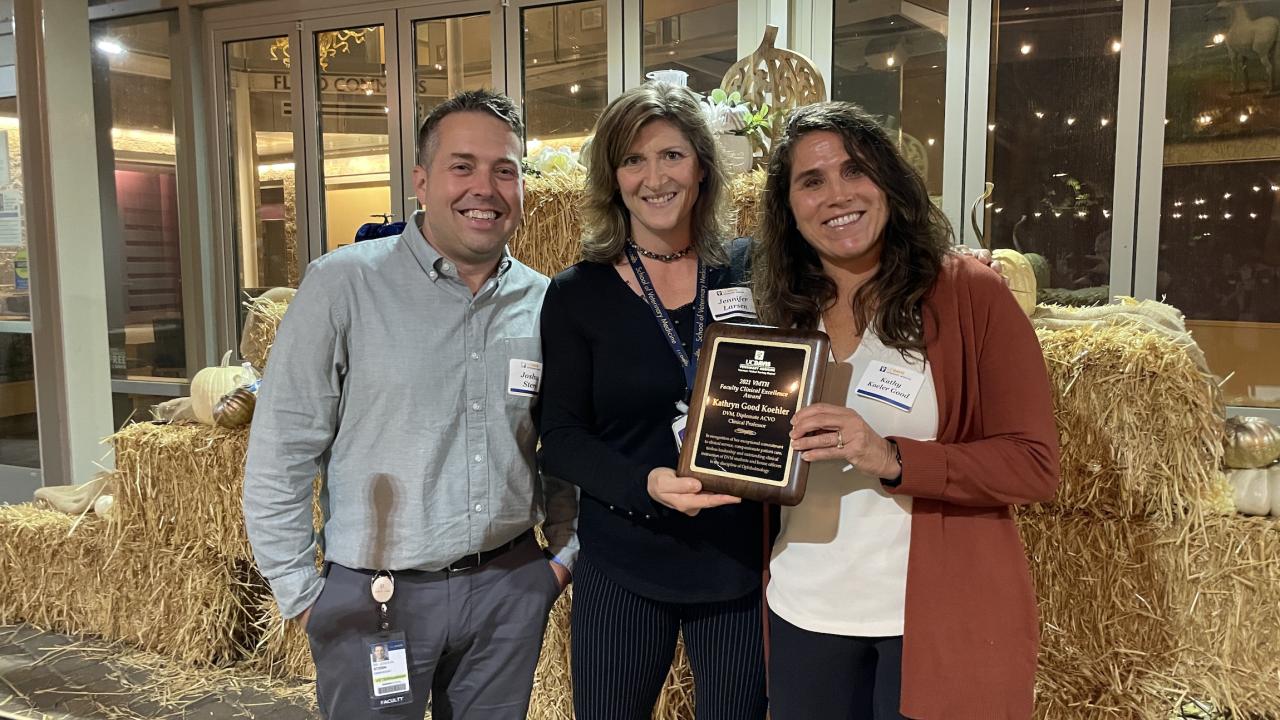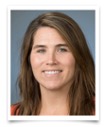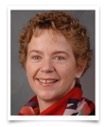
Fall Faculty Reception 2021
Fall Faculty Reception Awards
2021 Clinical Faculty Excellence Award: Dr. Kathy Koehler Good
2021 Zoetis Excellence in Research Award: Dr. Carrie Finno
2021 Zoetis Distinguished Veterinary Teacher Award : Dr. Verena Affolter
2021 Distinguished Faculty Teaching Award: Dr. Xinbin Chen
2021 Innovative Teaching Award: Dr. Carrie Palm, Dr. Emily Berryhill, Dr. Bret McNabb, Candace Aguilar, RVT, and Dr. Lane Johnson
2021 Distinguished Service Award: Dr. Jessica Light
2021 Innovative Teaching Award: Drs. Chai-Fei Li and Christine Toedebusch
Interim Dean John Pascoe welcomed new members of the school’s community during the annual Fall Faculty Reception on October 28 and acknowledged those in outgoing and incoming leadership roles. The school also honored faculty members with awards for excellence in teaching and research, along with others honored for their service.

Dr. Kathy Koehler Good was recognized with the 2021 Clinical Faculty Excellence Award for clinical excellence in ophthalmology.
A professor in the Department of Surgical & Radiological Sciences, Good received her DVM (1998) from UC Davis, completed a small animal internship at the University of Florida and an ophthalmology residency at UC Davis. A diplomate of the American College of Veterinary Ophthalmologists (2002), Good joined our faculty in 2008.
As Service Chief, Good provides remarkable cohesiveness, achieving balance between varying faculty interests to ensure delivery of outstanding patient care in ophthalmology, excellent clinical instruction, and operational efficiency to a degree where the Ophthalmology Service is widely appreciated as a model clinical service. Her faculty colleagues applaud her leadership and extraordinary commitment to excellence managing the service. Despite a 60% faculty appointment, she does this tirelessly, every day of her clinical year, and with professionalism, always being an exemplary role model.
A truly gifted clinical instructor with an unparalleled ability to mentor residents and teach students, Good consistently earns laudatory comments for her teaching, extensive clinical knowledge, delivery of state-of-the-art treatments, and compassionate care of her patients and clients. Good achieves what many aspire to, but few accomplish - an ability to both instruct through her words and her actions. Students regard Good as an absolutely outstanding role model - someone they aspire to be. In the end, that is the highest praise any clinical instructor can receive. Her expertise in glaucoma surgery and acquisition of cutting- edge equipment has dramatically expanded the diagnostic and therapeutic capabilities.
As one of her colleagues commented: “Kathy is one of the finest general ophthalmologists I know. While many of us have chosen to pursue surgical or medical approaches or confine our major atten- tion to more specific tissues or diseases, Kathy is a fine ophthalmic microsurgeon, a thoughtful and a contemplative medical ophthalmologist who is as comfortable delicately lasering a retinal detachment as she is tailoring a brilliantly conceived medical management plan for a cat with chronic conjunc- tivitis. Against this extraordinary breadth and depth of expertise, she is also the go-to person for all laser procedures, glaucoma shunt (valve) placement procedures, and challenging third eyelid gland replacement surgeries in those patients undergoing their umpteenth surgical redo. Quite frankly, she is who I would have treat my pet.”

Dr. Carrie Finno received the 2021 Zoetis Excellence in Research Award for her exceptional research on equine genetics and Vitamin E-associated neurodegeneration.
Finno received a BS (1999) from Emory University, DVM (2004) from the University of Minnesota, and PhD (Comparative Pathology) from UC Davis (2012). She completed an internship in large animal medicine (2005) at the University of Minnesota and a residency in Large Animal Internal Medicine (2008) at UC Davis, obtaining board certification as a Diplomate of the American College of Veterinary Internal Medicine (2008).
In 2014, Finno joined the Department of Population Health & Reproduction and is an Associate Professor of Veterinary Genetics.
Finno’s research productivity is truly exceptional and is on an uphill trajectory. Severe alpha-tocopherol deficiency can result in early-onset neurodegenerative disease, termed Ataxia with Vitamin E Deficiency (AVED), due to genetic mutations in tocopherol transfer protein (TTPA). Finno and her team use two animal models of alpha-tocopherol deficient neurodegeneration to examine the effect of diet and genotype on overall gene expression changes during early postnatal development. She uses the spontaneously occurring model of neuroaxonal dystrophy in the horse and the experimental tocopherol-transfer protein knockout model in the mouse. Her most significant findings thus far have defined the dysregulation of cholesterol homeostasis within the central nervous system of these two animal models of vitamin E deficient neurodegeneration.
Finno has further contributed immensely to the discovery of genetic mutations in horses, its association with specific diseases such as Hoof Wall Separation Disease in Connemara ponies, occipitoatlantoaxial malformation in Arabian horses, myosin-heavy chain myopathy in Quarter horses, and fatal hypocalcemia in Thoroughbred foals. She has further translated these genetic discoveries to widely available diagnostic tests. Finno is also a key player in an international effort to create a database of functional elements within the equine genome, the Functional Annotation of Animal Genomes (FAANG) consortium. These efforts have resulted in the establishment of an unprecedented biobank of more than 100 equine tissue types. Finally, Finno is a wonderful mentor to her students and trainees as attested by one of her graduate students: “Every research success in the Finno lab reflects a graduate or undergraduate student’s talent that has been carefully cultivated by the deft hand of Dr. Finno.”

Dr. Verena Affolter was recognized with the 2021 Zoetis Distinguished Veterinary Teacher Award for excellence in teaching pathology and dermatopathology in professional and graduate clinical programs.
A professor in the Department of Pathology, Microbiology and Immunology, Affolter received her DVM (1982) from University of Bern and PhD (1999) from UC Davis. She is a Diplomate of the European College of Veterinary Pathology (ECVP), began teaching at the SVM in 1997, and joined the faculty in 2005.
Affolter is a co-block leader for Skin Block (VET 411) and Comparative Medicine Stream (VET 432A/B/C) and teaches in several other blocks in the DVM curriculum. Students remark that she provides detailed notes with each slide and how helpful that is. There is a theme throughout the comments, from students who claim a lack of interest in histology, that when Affolter is teaching, they find it both interesting and fun.
Affolter has a major role in the clinical instruction of fourth year veterinary students in pathology. The comments from students are overwhelmingly positive and reflect superlative dedication and passion. One student commented, “I really loved having Dr. Affolter on as she made pathology seem less intimidating. I felt encouraged to voice ideas and opinions and never felt discouraged even when I was wrong.”
In addition to creating a safe and encouraging learning climate, there are two adjectives used to describe Affolter that appear with very high frequency: enthusiastic and engaged.
Affolter has held weekly dermatopathology rounds since 1997 and has served as faculty lead for the weekly biopsy conference since 2004. When reviewing comments provided by graduate clinical trainees, the profoundly positive nature of feedback is impressive. Residents describe Affolter as “fair, understanding and caring” and comment that she “never makes me feel stupid and encourages me to really investigate.”
Our integrative block curriculum at Davis requires that some instructors step up to lead large teams of faculty to organize, integrate, deliver and assess course content. Affolter provides leadership in multiple courses and her faculty colleagues comment on the outstanding quality, quantity and effectiveness of her clinical and didactic instruction. Adjectives used to describe her course leadership are proactive, collaborative and exemplary.

Dr. Xinbin Chen was recognized with the 2021 Distinguished Faculty Teaching Award for excellence in mentoring and training undergraduate and graduate students, postdoctoral fellows, and junior faculty; contributions to the teaching mission of the School; and successful support for, and leadership of, the Veterinary Scientist Training Program (VSTP), locally and nationally.
Director of the VSTP program and a Professor in the Department of Surgical & Radiological Sciences, Chen received his veterinary degree from Anhui Agricultural University (1982), MS (Microbiol- ogy) from Nanjing Agricultural University (1985), and PhD (1991) from Michigan State University. He was recruited in 2007 to lead the School’s Veterinary Oncology Program and later the Comparative Oncology Program at the UC Davis Comprehensive Cancer Center.
Internationally recognized for his expertise in developmental and cancer biology, especially the molecular genetics of cell cycle arrest, apoptosis and senescence, Chen’s investment in, and contributions to mentoring of trainees and junior faculty is exceptional. Working with the Director of Educational Enrichment and Outreach Programs, he designed research projects for undergraduate students from URM backgrounds to support and foster their interest in careers in medicine or medical research.
Chen participates in DVM (VET 412) and graduate (PMI 201) instruction. His leadership of VSTP has been outstanding and he is a committed champion of diversity, equity, and inclusion. Since 2015, the program has recruited 21 highly qualified students, including 6 representing URM groups. Chen spearheaded efforts to establish the National VSTP Association, which affords students from 14 veterinary colleges with DVM/PhD training programs an opportunity to interact with their peers and present at the annual National Veterinary Scholars meeting.
Chen also understands the importance of support for growth of a successful VSTP program. Together with Associate Dean Isaac Pessah, he successfully competed for the NIH Medical Scientist Training Program Grant (T32) that provides 5 years of funding supporting 5 DVM/PhD students. He also collaborated with colleagues on a National Cancer Institute (NCI) Training grant supporting 1 DVM/PhD student, 3 DVM graduates, and 1 MD graduate to work in comparative oncology. Dr. Chen is co-PI for the NIH T32 program and has mentored 6 DVM students, who successfully competed for fellowships and had positive research experiences in his lab.
Finally, Chen understands the need to support junior faculty. He is a creative and dedicated mentor who has successfully sponsored 3 SVM faculty for NIH K awards. One mentee put it well, “Dr. Chen’s vision and encouragement, his generosity with his time and resources have enabled my scientific growth and development.....commitment to his mentees, at all stages of training, cannot be overemphasized. Dr. Chen’s consistent open-door policy made it easy for me to trust him.”

Dr. Carrie Palm, Dr. Emily Berryhill, Dr. Bret McNabb, Candace Aguilar, RVT, and Dr. Lane Johnson were recognized with the 2021 Innovative Teaching Award for their passion for instruction, closing a gap in knowledge for our students, serving as an example of how the faculty drive the curriculum, innovation in delivery of diverse topics including student wellness, and serving as a model of teamwork for improved instruction in the design and implementation of VET442 - Advanced Clinical Skills & Hospital Operations.
This teaching team moved through a series of steps that would normally take over a year, in a matter of months. VET 442 was not perfect, but the word HELPFUL appeared 184 times in the evaluations of faculty and of the course. One student summarized their appreciation well, “The clinical skills labs were incredibly helpful. I also really enjoyed going over medical and fluid calculations. The final project was great for learning medical record writing and how VMACS works. I can’t imagine what going into clinics would look like without this course, and I just want to thank the instructors who worked so hard to make this happen for us this year! It is much appreciated.”

Dr. Jessica Light was honored with the school’s 2021 Distinguished Service Award in recognition of her sustained support of the school’s livestock clinical training programs.
Since the inception of the Early Veterinary Student Bovine Experience Program (EVSBEP) in 2000 under the leadership of Drs. Brad Smith and Jim Ver Steeg, Light has been a strong advocate developing industry support to maintain continuous funding of the program. The EVSBEP facilitates veterinary student experiential learning during the summer before their second and third year of veterinary school on a dairy, or with a dairy or food animal veterinarian.
EVSBEP provides an opportunity for students to familiarize themselves with livestock practice and increase their comfort level and confidence in considering becoming livestock veterinarians. For those students who decide on this career path, the experience also facilitates their transition to livestock clinical rotations in the 4th year. Since the inception of the program, more than 300 students have participated, and many have continued into livestock practice.
Beyond securing funding for the program, Dr. Light has served as a mentor to our students and has facilitated networking opportunities connecting students with mentoring practitioners. Working with Dr. John Angelos, a list of veterinarians was developed in concert with previous EVSBEP program participants to match students with highly successful food animal/dairy veterinarians in California and the western region. Light also coordinated an annual fall dinner for our livestock faculty and EVSBEP students to share and reflect on their summer experiences and achievements.
Student feedback characterizes this as an eye-opening, inspirational experience providing intimate exposure to the livestock industry, and the development of long-standing professional relationships with veterinarian mentors and potential employers.

Dr. Chai-Fei Li and Dr. Christine Toedebusch were recognized with a 2021 Innovative Teaching Award for their exceptional dedication to student learning and innovation in teaching; development of an interactive and challenging virtual clinical neurology course; and creation of effective methods to identify and fill gaps in student knowledge in the design and implementation of DVM480 – Neurology and Neurosurgery – virtual rotation.
Li and Toedebusch initiated and led the effort of our Neurology/Neurosurgery faculty to create a new virtual curriculum for the senior clinical rotation just two weeks after the VMTH closure. This teaching team developed a two week long, daily interactive curriculum, using novel approaches to keep the students engaged, challenged, interested, and motivated to learn the clinical neurology material. Li and Toedebusch included interactive lectures, as well as a journal club for a more in-depth discussion of the material in a small group format, and they completed the rotation with a fun but educational game of neurology jeopardy.

Students commented: “Dr. Li had great analogies for many difficult neuro concepts....I left each session with slightly more confidence in regard to neuro diseases.” and, “Dr. Toedebusch is such a diligent scholar and passionate teacher. .....I very much appreciate the great efforts that she put into developing the virtual course.”
Their faculty colleagues report, “Now that the students are back to their rotations ‘in person’ we continue to use some aspects of this virtual rotation ..... as they were an effective method to highlight clinically relevant information and finding gaps in the student’s knowledge base that could be identified and supplemented during the rotation.”
